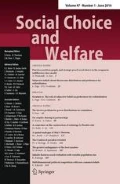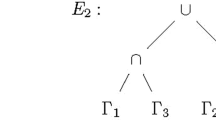Abstract
A simple game (N, v) is given by a set N of n players and a partition of \(2^N\) into a set \(\mathcal {L}\) of losing coalitions L with value \(v(L)=0\) that is closed under taking subsets and a set \(\mathcal {W}\) of winning coalitions W with value \(v(W)=1\). We let \(\alpha = \min _{p\geqslant {\varvec{0}}, p\ne {\varvec{0}}}\max _{W\in \mathcal{W}, L\in \mathcal{L}} \frac{p(L)}{p(W)}\). It is known that the subclass of simple games with \(\alpha <1\) coincides with the class of weighted voting games. Hence, \(\alpha \) can be seen as a measure of the distance between a simple game and the class of weighted voting games. We prove that \(\alpha \leqslant \frac{1}{4}n\) holds for every simple game (N, v), confirming the conjecture of Freixas and Kurz (Int J Game Theory 43:659–692, 2014). For complete simple games, Freixas and Kurz conjectured that \(\alpha =O(\sqrt{n})\). We also prove this conjecture, up to an \(\ln n\) factor. Moreover, we prove that for graphic simple games, that is, simple games in which every minimal winning coalition has size 2, the problem of computing \(\alpha \) is NP-hard, but polynomial-time solvable if the underlying graph is bipartite. Finally, we show that for every graphic simple game, deciding if \(\alpha <\alpha _0\) is polynomial-time solvable for every fixed \(\alpha _0>0\).
Similar content being viewed by others
Notes
A related notion, introduced by Freixas and Marciniak (2010), is that of the codimension of a simple game (N, v), which is the smallest number of weighed voting games whose union equals (N, v). Here, the union of two simple games \((N,v_1)\) and \((N,v_2)\) with sets of winning coalitions \(\mathcal{W}_1\) and \(\mathcal{W}_2\), respectively, is the simple game (N, v) with set of winning coalitions \(\mathcal{W}=\mathcal{W}_1\cup \mathcal{W}_2\).
The notion of a blocker was originally defined by Edmonds and Fulkerson (1970) as the collection of minimal covers, but for simplicity of exposition, we define it as the collection of all covers.
For every nonempty polyhedron P, the program \(\min \{\left||p \right||^2_2\,|\, p\in P\}\) is a feasible convex quadratic program with a strictly convex objective function, where all values of the function are bounded from below by 0. Hence, \(\min \{\left||p \right||^2_2\,|\, p\in P\}\), and consequently \(\min \{\left||p \right||_2\,|\, p\in P\}\), has a unique optimal solution (see, for example, Borwein and Lewis 2000).
This result and a proof have appeared in an extended abstract published in the proceedings of SAGT 2018 (Hof et al. 2018). As outlined by one of the referees, the proof given there contained a mistake and we include a correct proof in this paper resulting in a slightly weaker upper bound.
References
Abdi A (2018) Ideal clutters. Ph.D. thesis, University of Waterloo
Axenovich M, Roy S (2010) On the structure of minimal winning coalitions in simple voting games. Soc Choice Welf 34:429–440
Bachrach Y, Elkind E, Malizia E, Meir R, Pasechnik D, Rosenschein J, Rothe J, Zuckerman M (2018) Bounds on the cost of stabilizing a cooperative game. J Artif Intell Res 63:987–1023
Balas E, Yu CS (1989) On graphs with polynomially solvable maximum-weight clique problem. Networks 19:247–253
Bilbao JM, García JRF, Jiménez N, López JJ (2002) Voting power in the European Union enlargement. Eur J Oper Res 143:181–196
Biro P, Kern W, Paulusma D (2012) Computing solutions for matching games. Int J Game Theory 41:75–90
Bock A, Chandrasekaran K, Könemann J, Peis B, Sanitá L (2015) Finding small stabilizers for unstable graphs. Math Program 154:173–196
Borwein J, Lewis A (2000) Convex analysis and nonlinear optimization. Springer, Berlin
Brandstädt A, Mosca R (2018) Maximum weight independent set in $l$claw-free graphs in polynomial time. Discret Appl Math 237:57–64
Carreras F, Freixas J (2005) On power distribution in weighted voting. Soc Choice Welf 24:269–282
Chalkiadakis G, Elkind E, Wooldridge M (2011) Computational aspects of cooperative game theory. Morgan and Claypool Publishers, San Rafael
Deineko VG, Woeginger GJ (2006) On the dimension of simple monotonic games. Eur J Oper Res 170:315–318
Edmonds J, Fulkerson D (1970) Bottleneck extrema. J Comb Theory 8:299–306
Elkind E, Chalkiadakis G, Jennings NR (2008) Coalition structures in weighted voting games. In: Proceedings of ECAI 2008, frontiers in artificial intelligence and applications, vol 178, pp 393–397
Elkind E, Goldberg LA, Goldberg PW, Wooldridge M (2009) On the computational complexity of weighted voting games. Ann Math Artif Intell 56:109–131
Faigle U, Kern W, Fekete S, Hochstaettler W (1998) The nucleon of cooperative games and an algorithm for matching games. Math Program 83:195–211
Faigle U, Kern W, Still G (2002) Algorithmic principles of mathematical programming. Kluwer Academic Publishers, Dordrecht
Fishburn P, Brams S (1996) Minimal winning coalitions in weighted-majority voting games. Soc Choice Welf 13:397–417
Freixas J, Kurz S (2014) On $\alpha $-roughly weighted games. Int J Game Theory 43:659–692
Freixas J, Marciniak D (2010) On the notion of dimension and codimension of simple games. Contrib Game Theory Manag 3:67–81
Freixas J, Puente MA (2008) Dimension of complete simple games with minimum. Eur J Oper Res 188:555–568
Freixas J, Molinero X, Olsen M, Serna M (2011) On the complexity of problems on simple games. RAIRO Oper Res 45:295–314
Garey MR, Johnson DS (1979) Computers and intractability: a guide to the theory of np-completeness. W. H. Freeman & Co., New York
Gvozdeva T, Hemaspaandra LA, Slinko A (2013) Three hierarchies of simple games parameterized by “resource” parameters. Int J Game Theory 42:1–17
Hegedüs T, Megiddo N (1996) On the geometric separability of Boolean functions. Discret Appl Math 66:205–218
Hof F, Kern W, Kurz S, Paulusma D (2018) Simple games versus weighted voting games. In: Proceedings of SAGT 2018, LNCS 11059, pp 69–81
Isbell JR (1956) A class of majority games. Q J Math 7:183–187
Kern W, Paulusma D (2003) Matching games: the least core and the nucleolus. Math Oper Res 28:294–308
Könemann J, Pashkovich K, Toth J (2019) Computing the nucleolus of weighted cooperative matching games in polynomial time. In: Proceedings of IPCO 2019, LNCS 11480, pp 413–426
Kurz S, Molinero X, Olsen M (2016) On the construction of high dimensional simple games. Proc ECAI 2016:880–885
Nguyen T, Zick Y (2018) Resource based cooperative games: optimization, fairness and stability. In: Proceedings of SAGT 2018, LNCS 11059, pp 239–244
Pashkovich K (2018) Computing the nucleolus of weighted voting games in pseudo-polynomial time. arXiv:181002670
Peled UN, Simeone B (1985) Polynomial-time algorithms for regular set-covering and threshold synthesis. Discret Appl Math 12:57–69
Peters H (2008) Game theory. Springer, Berlin
Schrijver A (1998) Theory of linear and integer programming. Wiley, New York
Shapley LS (1962) Simple games: an outline of the descriptive theory. Behav Sci 7:59–66
Solymosi T, Raghavan TE (1994) An algorithm for finding the nucleolus of assignment games. Int J Game Theory 23:119–143
Taylor AD, Zwicker WS (1993) Weighted voting, multicameral representation, and power. Games Econ Behav 5:170–181
Taylor AD, Zwicker WS (1999) Simple games: desirability relations, trading, pseudoweightings. Princeton University Press, Princeton
Tsukiyama S, Ide M, Ariyoshi H, Shirakawa I (1977) A new algorithm for generating all the maximal independent sets. SIAM J Comput 6:505–517
von Neumann J, Morgenstern O (1944) Theory of games and economic behavior. Princeton University Press, Princeton
Acknowledgements
The second and fifth author thank Péter Biró and Hajo Broersma for fruitful discussions on the topic of the paper. The fourth author thanks Ahmad Abdi for valuable and helpful discussions. We also thank two anonymous reviewers for helpful comments.
Author information
Authors and Affiliations
Corresponding author
Additional information
Publisher's Note
Springer Nature remains neutral with regard to jurisdictional claims in published maps and institutional affiliations.
A partial answer to the conjecture of Freixas and Kurz appeared, together with the results in Sects. 3 and 4 of this paper, in an extended abstract published in the proceedings of SAGT 2018 (Hof et al. 2018).
Rights and permissions
About this article
Cite this article
Hof, F., Kern, W., Kurz, S. et al. Simple games versus weighted voting games: bounding the critical threshold value. Soc Choice Welf 54, 609–621 (2020). https://doi.org/10.1007/s00355-019-01221-6
Received:
Accepted:
Published:
Issue Date:
DOI: https://doi.org/10.1007/s00355-019-01221-6




